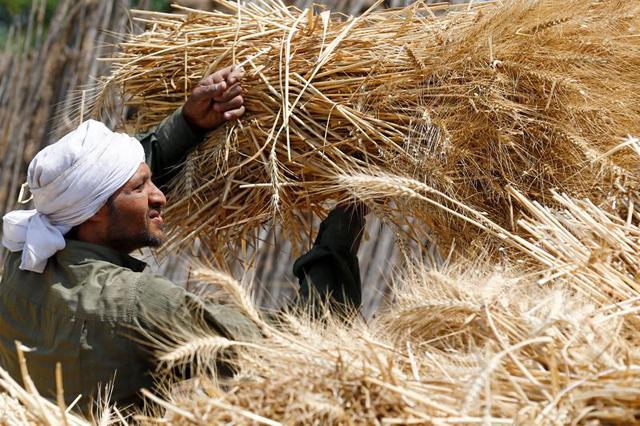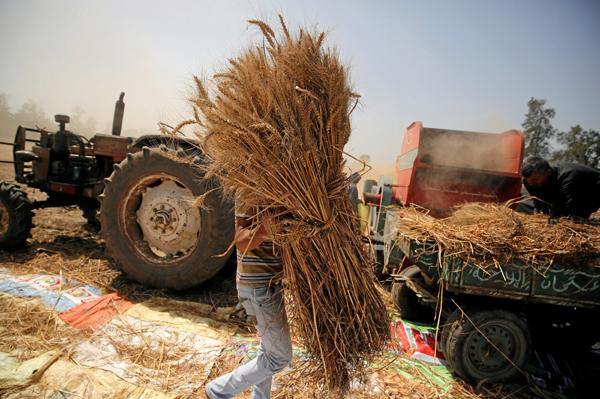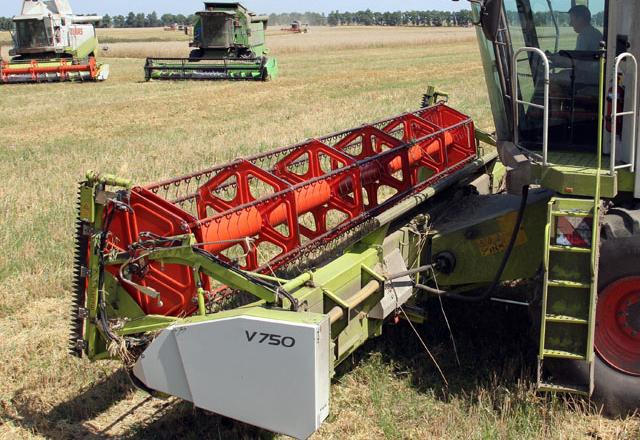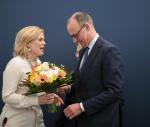You are here
Egypt may reject French wheat as tough inspections rattle trade
By Reuters - Sep 10,2017 - Last updated at Sep 10,2017

A farmer carries wheat crop on a field in El Menoufia governorate, north of Cairo, Egypt, on May 16 (Reuters file photo)
DUBAI/CAIRO — Egypt is considering rejecting 59,000 tonnes of French wheat purchased by state grain buyer GASC due to the presence of poppy seeds, the second cargo to come under such scrutiny and raising fresh uncertainty over the country’s import policy.
The world’s biggest wheat importer threw the international grains market into confusion in 2015 by rejecting a cargo that contained the common wheat fungus ergot, triggering a row over policy in Cairo that is still simmering and worrying traders.
Egypt’s agricultural ministry said on Sunday its quarantine authority was examining seeds in the French cargo.
“If they prove to be poppy seeds, a decision will be taken to reject the shipment and transfer the case to the general prosecutor,” spokesman Hamid Abdel Dayim told Reuters.
That would be the second case transferred to the general prosecutor in less than a month after a 63,000 tonnes Romanian wheat cargo was rejected by quarantine and is now under review by the prosecutor’s office for re-export.
The back-to-back cases have raised red flags among traders, who called poppy seeds “the new ergot” and an attempt by Egypt’s agriculture quarantine service to tighten import rules after losing its fight to ban the fungus last year.
Transgrain France, a supply company responsible for the French cargo, said it seemed strange for “quarantine to suddenly discover this type of seed for the first time in decades” and said quarantine may have confused the seeds with another type of poppy found in France but which is not toxic.
Tougher inspections
In December 2015, the rejection of a French wheat shipment purchased by GASC for containing ergot set off a nearly year-long row over import requirements as Egypt’s quarantine authority imposed a ban on any trace level of the fungus.
Trading companies said the requirement was impossible to guarantee and boycotted state tenders, effectively cutting Egypt off from global grains markets.
Egypt spends billions of pounds each year on wheat and bread subsidies to secure food for tens of millions of its poorest. The political sensitivity of the availability and price of the staple makes ensuring supplies a top government priority.
Following the boycotts, Egypt scrapped its zero-ergot policy and came into line with international standards to win back traders to its tenders. It also stopped sending Egyptian quarantine inspectors abroad to check on grain shipments and started using private companies instead.
But the new system was successfully challenged in court by a group of quarantine inspectors who argued it had allowed contaminants hazardous to plants and animals into the country.
The government has not implemented the court order and is appealing the decision, leaving the new system in limbo.
“The agricultural quarantine is trying to put more pressure, they want delegations to travel abroad again,” one Cairo-based trader said.
Traders also said inspection companies abroad at ports of origin were being more meticulous in searching for poppy seeds to avoid problems when shipments arrive in Egyptian ports.
“There are currently two Romanian cargoes at ports of origin that have been told to change their wheat supply for the presence of poppy seeds,” another trader said.
“They are nervous now with what is happening,” he added.
Related Articles
ABU DHABI/CAIRO — Rattled by stringent new import rules, Egypt's wheat suppliers boycotted en masse a state tender on Tuesday, pushing the w
CAIRO — Egypt will send a delegation to Moscow next week hoping to resolve a dispute with Russia that began when Cairo refused a Russian whe
Turmoil in Ukraine is driving Middle Eastern grain buyers to shy away from striking new deals there and to consider rival suppliers, a shift that is likely to push up import bills.

















